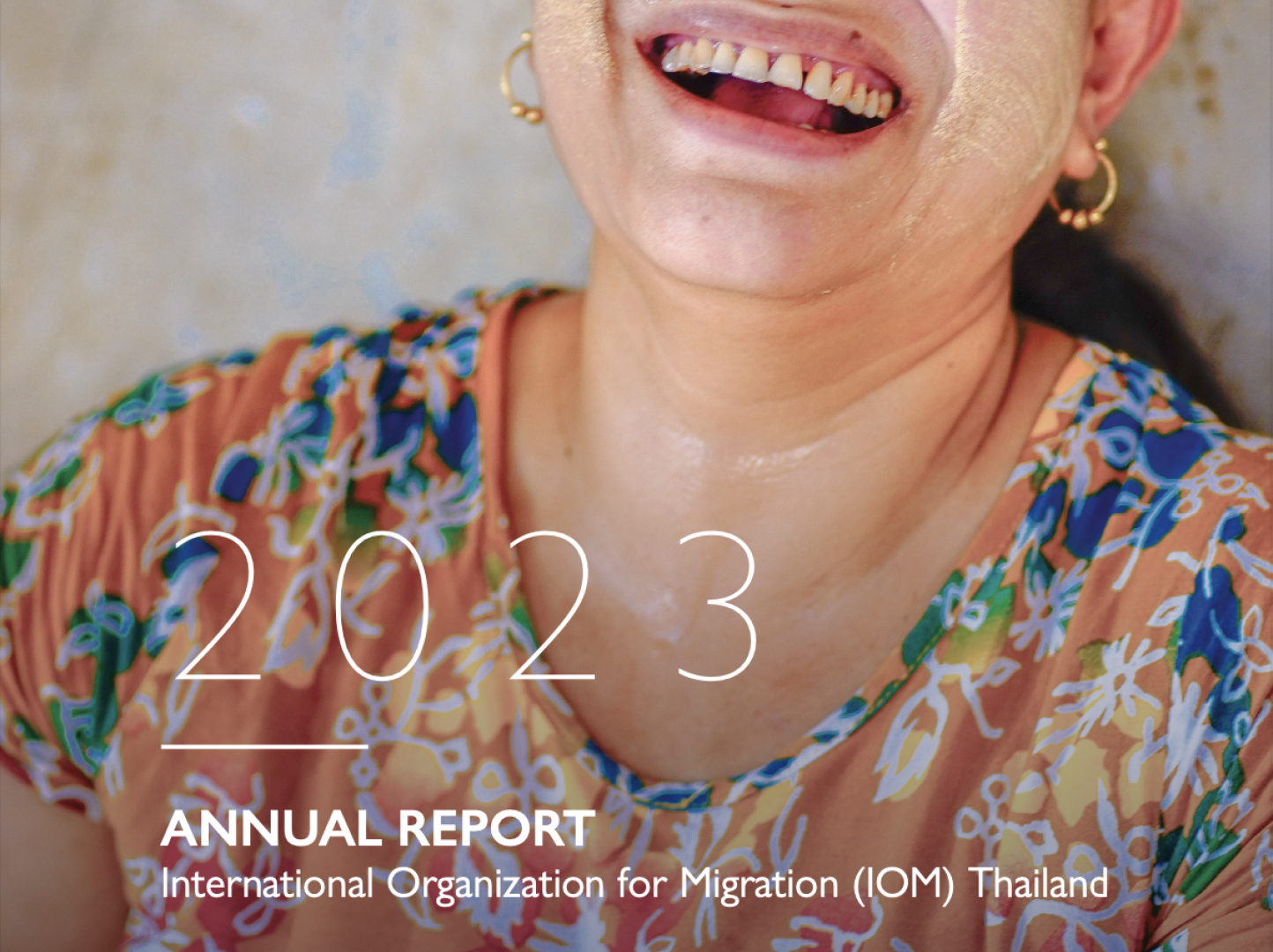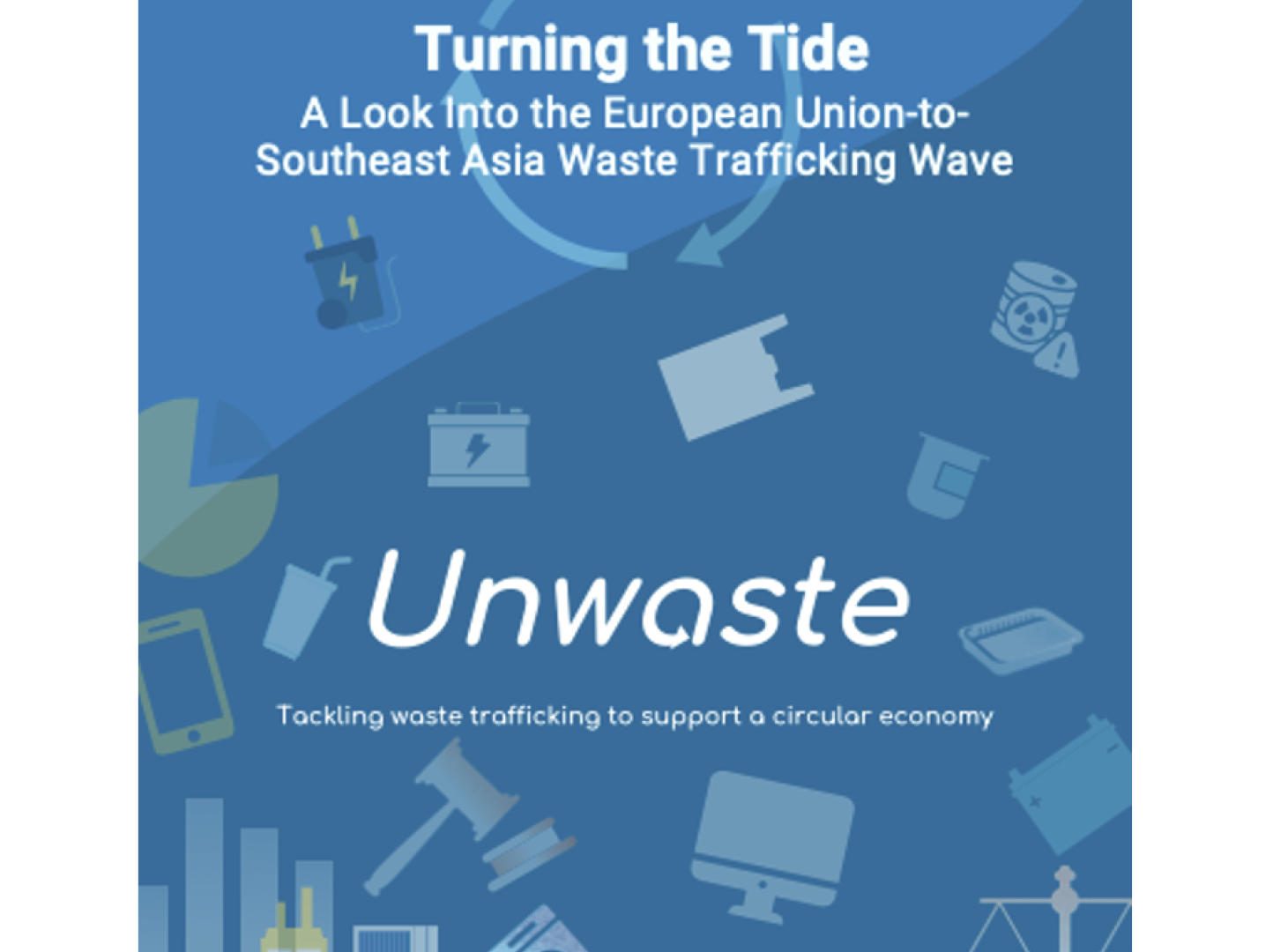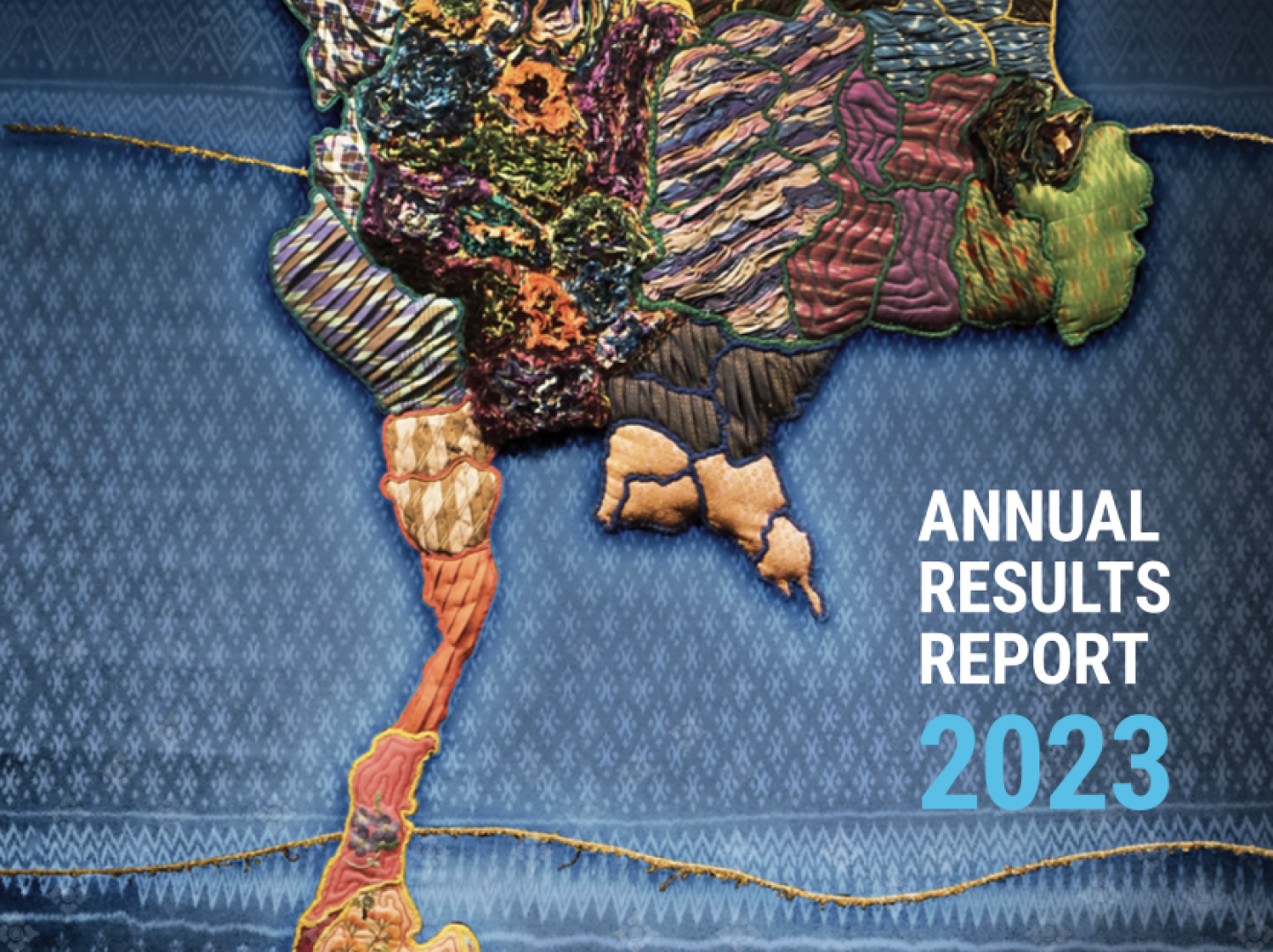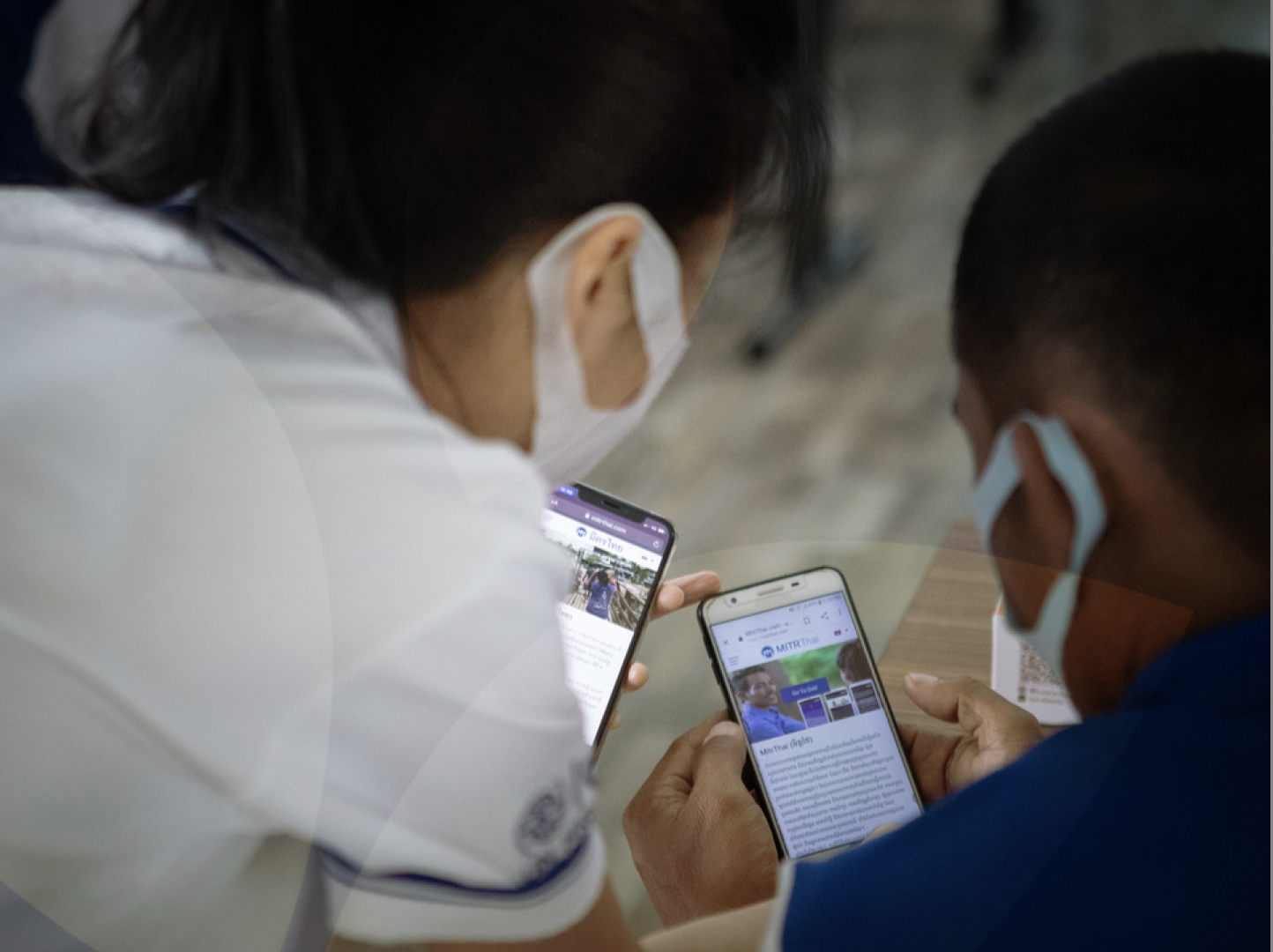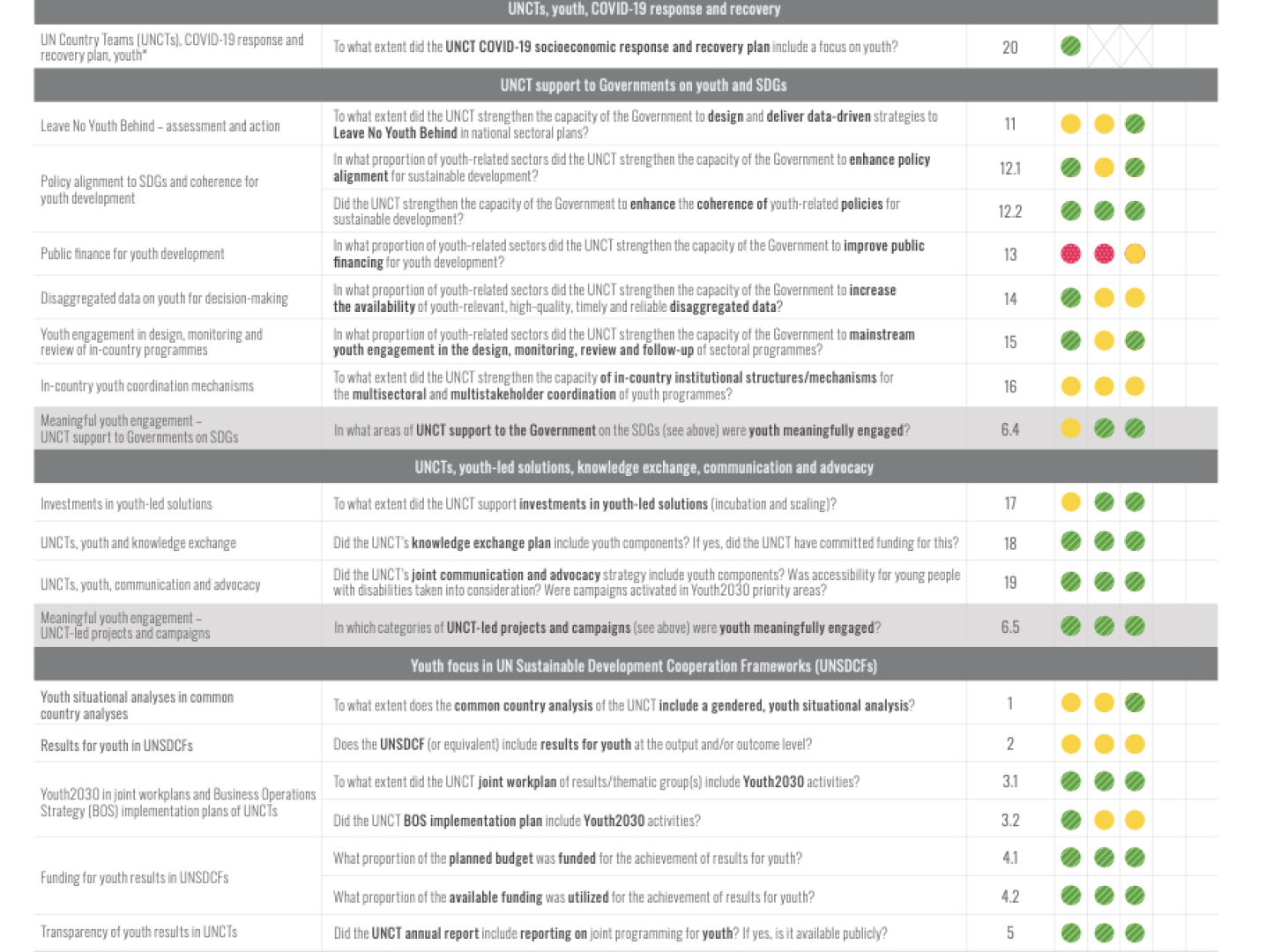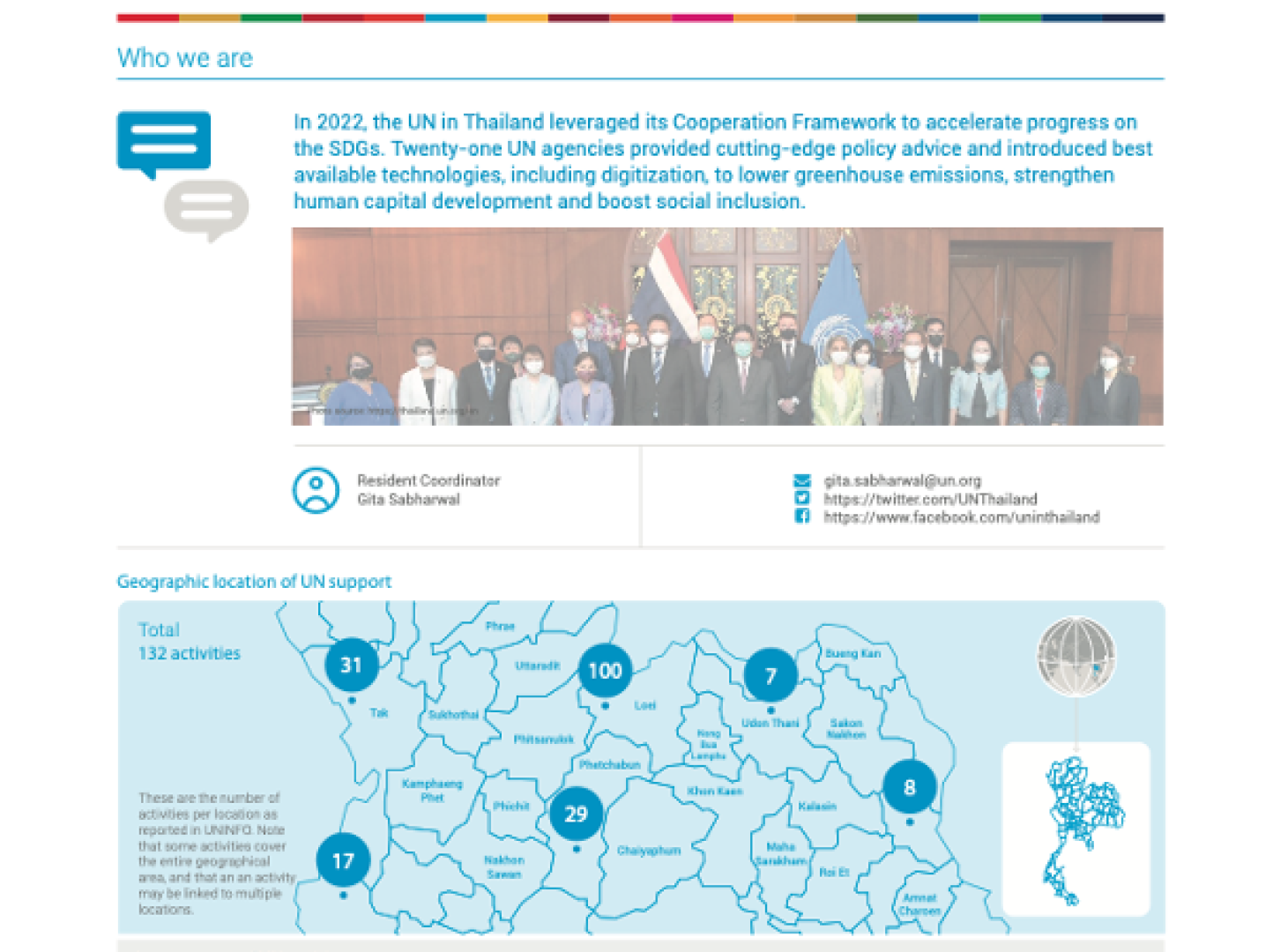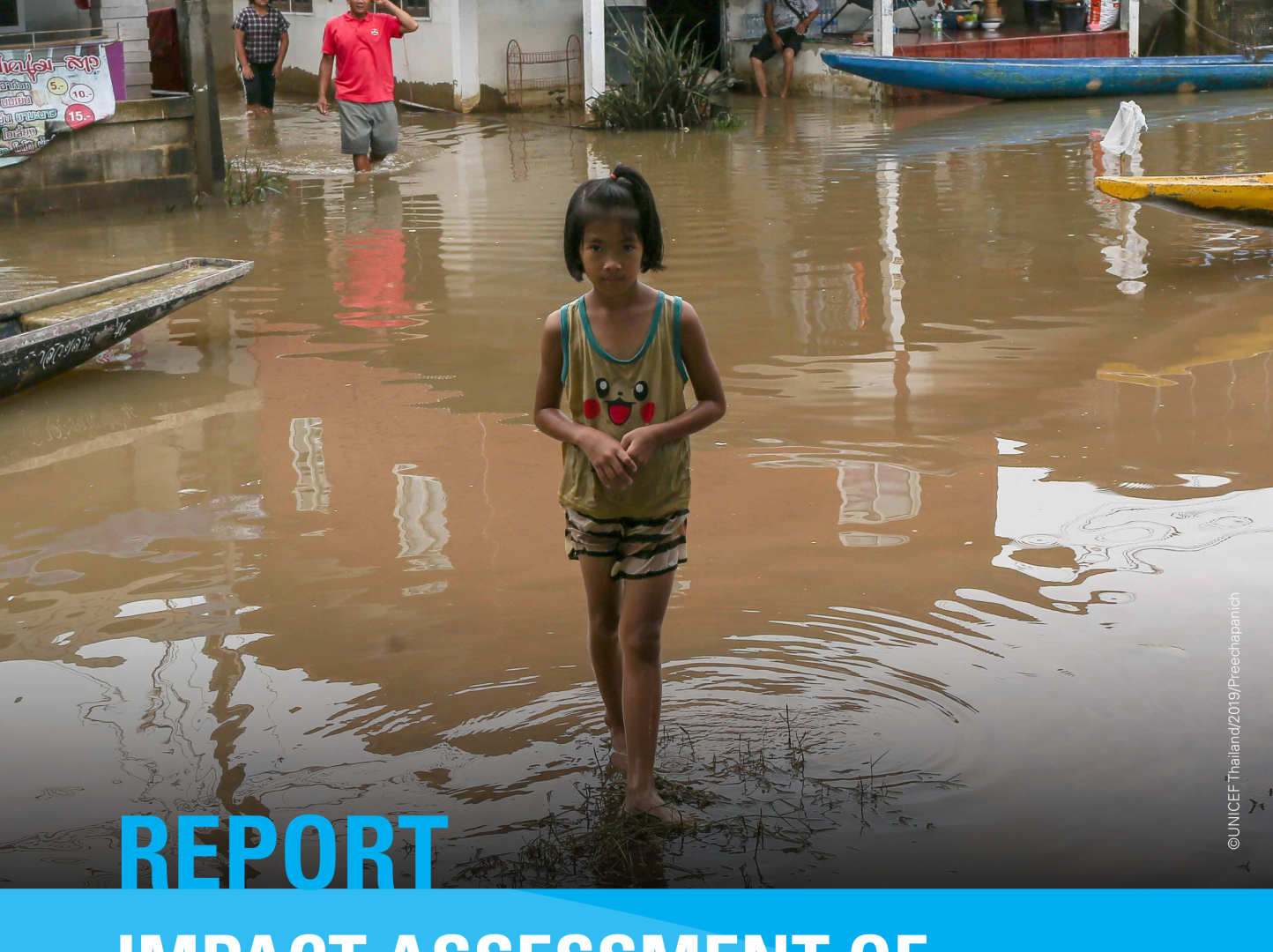Latest
Press Release
28 December 2025
Statement attributable to the Spokesperson for the Secretary-General on Cambodia-Thailand
Learn more
Speech
26 December 2025
UN Secretary-General’s Message on The International Day of Epidemic Preparedness
Learn more
Video
17 December 2025
UN Secretary-General's Video Message to the International Conference on the Global Partnership Against Online Scams
Learn more
Latest
The Sustainable Development Goals in Thailand
The United Nations Country Team (UNCT) in Thailand is dedicated to advancing all the Sustainable Development Goals (SDGs), while emphasizing the importance of SDG localization, which brings the global agenda to the local level for effective impact. Amongst others, some highlights of our efforts encompass promoting integrated social protection for all (SDG 1.3), combatting non-communicable diseases (SDG 3.4), ensuring inclusive education, including migrant children (SDG 4.1), and advocating for women's participation in politics (SDG 5.5). We empower small to medium-sized enterprises and youth innovation, with a focus on business and human rights as well as digital transformation (SDG 8.3). Inclusive growth extends to marginalized groups, including the LGBTI community (SDG 10.2), while migration governance promotes safe, regular, and orderly migration (SDG 10.7). Our endeavors encompass implementing climate change strategies (SDG 13.2), solid waste management (SDG 11.6), and greening industry through promoting low carbon transition and finance among SMEs (SDG 7.2). Additionally, we strongly advocate for ensuring access to rights through inclusive citizenship (SDG 16.9), and share Thailand's experiences and best practices (SDG 17.9) through South-South and Triangular Cooperation. Through these collaborative efforts, we embark on a transformative journey to create a sustainable, inclusive, and prosperous Thailand.
Story
19 March 2025
80 Years of the United Nations
Born out of the ashes of the Second World War, the organization was the result of a global commitment to “save succeeding generations from the scourge of war.”The founding of the UN also signaled a commitment to an entirely new level of international cooperation grounded in international law and the UN Charter. Eight decades later, one can draw a direct line between the creation of the United Nations and the prevention of a third world war.Today, the United Nations remains the essential, one-of-a-kind meeting ground to advance peace, prosperity and human rights.The UN works tirelessly to support countries as they tackle poverty, hunger and disease, while also supporting people in need during times of conflict and disaster. The organization has advanced justice and fairness through international law and respect for human rights, while also pushing for peace through dialogue, debate, diplomacy and consensus-building.Multilateral cooperation is the beating heart of the United Nations, but multilateralism is only as strong as each and every country’s commitment to it.And because we believe in the singular value and purpose of the United Nations, we always strive to improve the institution and the way we work.Amid the profound challenges facing our world today, global solidarity and solutions are needed more than ever. Adapted from the remarks of United Nations Secretary-General António Guterres to the Security Council on 18 February 2025.
1 of 5
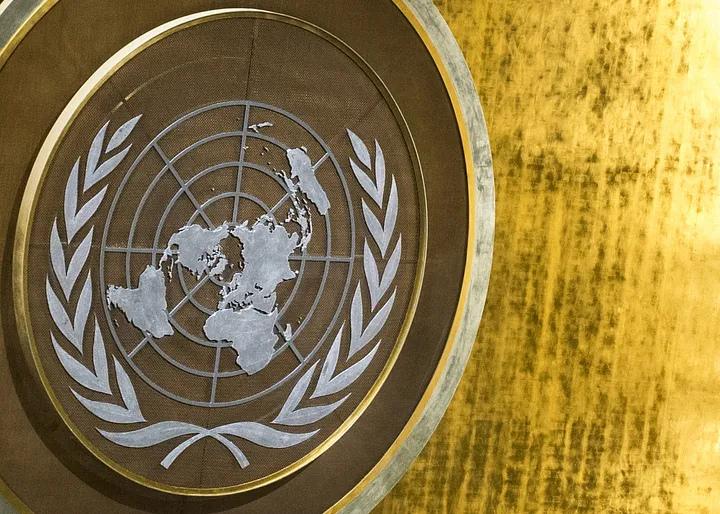
Photo
24 October 2025
United Nations Day 2025
On 24 October 2025, Thailand marked United Nations Day and the 80th anniversary of the UN by reaffirming its commitment to multilateralism and the 2030 Agenda.
1 of 5
https://www.flickr.com/photos/unthailand/albums/72177720329883138
Photo
26 September 2025
Sustainability Expo 2025
The UN Experience Pavilion returns for its 4th year at Sustainability Expo, bringing an immersive experience that connects the SDGs to daily life.
1 of 5
https://www.flickr.com/photos/unthailand/albums/72177720329314342
Story
20 August 2025
Thailand Marks Milestone in Localizing SDGs Through Data-Driven Community Investment
Bangkok, 20 August 2025 – Thailand today celebrates a milestone in its journey to localize the Sustainable Development Goals (SDGs) with the closing ceremony of the Joint SDG Fund project, ‘Partnership to Accelerate SDG Localization in Thailand.’ Led by the United Nations Development Programme (UNDP) and the United Nations Human Settlements Programme (UN-Habitat), in collaboration with the Ministry of Interior, the initiative has successfully bridged local data gaps and transformed insights into targeted SDG investment for communities.Over 120 representatives from government agencies, state enterprises, local authorities, the private sector, academia, and civil society came together to exchange knowledge on local SDG monitoring, innovative financing, waste bank development, and inclusive participation under the theme “Advancing Local Action for SDGs: Developing Insight into Investment and Action.” Drawing on lessons from the project’s pilot provinces of Udon Thani and Surat Thani, the platform deepened stakeholders’ understanding of practical tools and models for local SDG implementation, strengthened cross-sector collaboration, generated insights for future policy, and reaffirmed commitments to integrate the SDGs into local planning, financing, and monitoring.“SDG Localization is not merely about frameworks or mechanisms—it is about people. It is about ensuring that the promise of the SDGs is felt in everyday life, bringing hope, resilience, and tangible benefits to our communities.” said Mr. Saransak Srikruanet, Inspector General, Ministry of Interior.Through the Joint SDG Fund, the project has delivered a suite of scalable tools, models, and frameworks to support provinces and municipalities in implementing the SDGs. Key achievements include:• A National Voluntary Local Review (VLR) Framework to guide municipalities in monitoring SDG progress focused on people’s ‘perspective’ towards SDGs, alongside the completion of the Koh Samui VLR, which serves as a model for other municipalities.• A finalised SDG Profile Guideline to strengthen provincial planning and SDG monitoring, building on the SDG profiles of 15 pilot provinces supported by the European Union.• Financial Mechanism Assessments in Udon Thani and Surat Thani to explore local financing pathways.• SDG-Aligned Project Proposals to support localised action.• A Waste Bank Guideline promoting community-led sustainability, developed from the waste bank initiative in Koh Samui, Surat Thani.“SDG Localization is not merely about frameworks or mechanisms—it is about people. It is about ensuring that the promise of the SDGs is felt in everyday life, bringing hope, resilience, and tangible benefits to our communities.” said Mr. Saransak Srikruanet, Inspector General, Ministry of Interior.“The Joint SDG Fund provided catalytic seed funding that enabled Thailand to pioneer practical models for SDG localization, from provincial SDG profiles in 15 provinces to new financing pathways and Voluntary Local Reviews. These tools have already engaged over 318,000 people and are helping municipalities turn priorities such as wastewater management and community-led waste banks into real improvements in people’s lives.” said Ms. Michaela Friberg-Storey, United Nations Resident Coordinator for Thailand.“Thailand has long been at the forefront of advancing the SDGs, transitioning toward an inclusive and green economy. Driving SDG action at the local level makes progress more grounded, sustainable, and closer to people’s realities. The tools, models, and pilots from this UN joint initiative offer insights and practices to help provinces and municipalities understand people’s needs behind the figures and leverage data for SDG investment. With the great partnership with the Ministry of Interior, these tools shine a light on Thailand’s SDG journey as an inspiration for other countries, North and South.” said Ms. Niamh Collier-Smith, UNDP Resident Representative to Thailand.“Sustainable development becomes real when people can see themselves when the data, reports and the decisions making meaningful change and improvements to the quality of lives of people. By connecting statistics with lived experiences, Thailand’s local SDG work is proving that communities are not just beneficiaries but active drivers of change. UN-Habitat is honored to walk alongside Thailand in making the SDGs meaningful and inclusive at the community level.” said Mr. Srinivasa Popuri, Chief of UN-Habitat Bangkok Multi-Country Office. In Thailand, prior to COVID-19, achieving the SDGs required an estimated 1.27 trillion THB per year, or 11.6% of GDP, rising to 1.4 trillion THB post-pandemic. With SDG data availability at 64% as of 2024, this underscores the importance of bridging local data gaps and institutionalising SDG monitoring.In response, with support from the Joint SDG Fund, UNDP launches an SDG Profile Guideline built on Thailand’s first provincial SDG profiles, developed for 15 pilot provinces with funding from the European Union. This provides a systemic approach to monitoring progress in each province, alongside Financial Mechanism Assessments for Udon Thani and Surat Thani that can guide other provinces in aligning, channelling, and mobilising resources for the SDGs.Meanwhile, UN-Habitat is advancing SDG monitoring through the Voluntary Local Review (VLR) Framework, which goes beyond statistical data to capture community perceptions and perspectives on sustainable development in their areas. The VLR Framework uses lessons learned from cities in assessing their SDG progress and identify concrete actions to achieve sustainable development. For instance, in Koh Samui strong community concern over wastewater management amid growing tourism has led to local support for initiatives to tackle this issue. Building on successes from VLR processes in Ko Samui, Surat Thani, Udon Thani and Nakhon Si Thammarat, the VLR Framework will now guide other municipalities across Thailand in their journey toward more sustainable cities. Together, these joint UN efforts bring a set of expertise that strengthens both monitoring and financing systems, supporting Thailand accelerate targeted investment, ensure SDG action responds to local realities, and advance its path toward sustainable development.For more information:Pan Piyasilp, Project Manager, SDG Localisation
pan.piyasil[@]undp.orgPatthiya Gitpot, Local Project Officer
patthiya.gitpot[@]un.orgAbout UNDP: UNDP is the United Nations’ lead agency on international development. We support countries and communities as they work to eradicate poverty, implement the Paris Agreement on climate change and achieve the Sustainable Development Goals. We advocate for transformative change, and we connect countries to the resources they need to help people build a better life. Learn more at undp.org or follow at @UNDP.About UN-Habitat: UN-Habitat is the United Nations entity working for sustainable urbanization. With programmes in over 90 countries, it supports policymakers and communities to create socially and environmentally sustainable cities and towns. UN-Habitat promotes transformative changes in urban areas through knowledge, policy advice, technical assistance, and collaborative action. To know more, visit unhabitat.org or follow us on X @UNHABITAT.
pan.piyasil[@]undp.orgPatthiya Gitpot, Local Project Officer
patthiya.gitpot[@]un.orgAbout UNDP: UNDP is the United Nations’ lead agency on international development. We support countries and communities as they work to eradicate poverty, implement the Paris Agreement on climate change and achieve the Sustainable Development Goals. We advocate for transformative change, and we connect countries to the resources they need to help people build a better life. Learn more at undp.org or follow at @UNDP.About UN-Habitat: UN-Habitat is the United Nations entity working for sustainable urbanization. With programmes in over 90 countries, it supports policymakers and communities to create socially and environmentally sustainable cities and towns. UN-Habitat promotes transformative changes in urban areas through knowledge, policy advice, technical assistance, and collaborative action. To know more, visit unhabitat.org or follow us on X @UNHABITAT.
1 of 5

Story
26 June 2025
#WhenWomenLead – A woman’s determination leads to healthy, low-carb and high-protein Tasted Better flour
After studying law at Thammasat University in Bangkok and the University of California, Berkeley, Perada Supopun started a law career, including at Thailand’s Ministry of Justice. However, her entrepreneurial spirit was ignited by her desire to help her husband manage his weight and health.Perada and Trai Sasatavadhana, Tasted Better’s Chief Technology Officers and Co-founders, created a versatile plant protein-based, low-glycemic index flour that can replace wheat flour one-to-one. The flour is not only high in protein and fibre but also five times lower in carbohydrates. It has a two-year shelf life and requires no refrigeration. Tasted Better company was founded in Bangkok in 2018 and began selling its bread, Dancing With A Baker, made with the flour in 2019. "We were able to position our flour as a game-changer in the local market because it was a versatile and healthier option,” says Perada, now 35.Perada has a team of eight, and all Tasted Better products are sold online.Of the WE RISE Together training that she and her team attended, Perada says, “My best memory was the incredible energy during the workshops. Even with more than 100 people, I felt a real sense of community and support. Seeing women from diverse backgrounds learning and encouraging each other was truly inspiring.”The training “pushed us to think bigger and bolder,” she says. “After the programme, we started to shift from a niche 'healthy market' strategy to targeting the mass market.” This led to new collaborations and new product lines. Perada has partnered with 18 different manufacturers and distributors in the Republic of Korea to use the flour to make ready-to-eat products, including vegan pasta under the brand LENZEN.Tasted Better products will be sold in the Republic of Korea later this year, and the company has secured a letter of intent from a conglomerate to distribute in Hong Kong. “Getting a letter of intent from a potential distributor in Hong Kong was a major milestone for us,” Perada says. “It felt like we were finally being recognized for the hard work we’d put in.” Perada’s achievements have led to invitations to speak at international forums and to support from Space-F, Thailand’s first global “foodtech” startup incubator and accelerator, at Mahidol University in Bangkok.
1 of 5

Story
04 November 2025
Champions of Change: When Preparedness Becomes Culture
This interview was conducted in September, 2025 by UNDP as part of the regional Tsunami Project, supported by the Government of Japan. Every year, the sound of the evacuation bell echoes across Chumchonbansaladan School, a school on Koh Lanta Island, Krabi province in southern Thailand. It’s not an alarm - it’s a lesson. For Director Ratchadaporn Thanlek and Teacher Pongsak B. Puangphet, tsunami evacuation drills are more than just an exercise – they are a promise to protect their students, and to their families, and to their community through preparedness. “Be prepared for everything, when you prepare, you are conscious, and when you learn, you will master it.” – This is the life moto that Director Ratchadaporn Thanlek lives by. Turning lessons into leadership For both champions, who have become leading school teachers of the regional Tsunami Project, the reason behind their dedication was always clear. When the Indian Ocean Tsunami in 2004 struck, Pongsak’s sister was on Phuket Island, one of the hardest hits areas. His family waited three agonising days before learning she had survived. Since then, he dedicated himself to building resilience, becoming a preparedness instructor and later a facilitator supporting other schools in their preparedness efforts. For Ratchadaporn, living and working in a tsunami-prone area has made preparedness deeply personal. She dedicated herself to preparing her students for tsunamis. Her commitment and proactive approach have made Chumchonbansaladan School a model for others, showcasing how school leadership and preparedness can protect future generations. Her dedication embodies the true heart of this World Tsunami Awareness Day: preparedness saves lives. From lessons to action Three years ago, when Chumchonbansaladan School joined the UNDP-Government of Japan regional Tsunami Project - an initiative to help strengthen school tsunami preparedness across Asia and the Pacific - they turned their motivation into action. With support from the project, Ratchadapron, Pongsak, other school teachers and student leaders at Chumchonbansaladan School developed a tsunami evacuation plan that included measures to support students with disabilities. Together, they assessed evacuation routes, communicated with foreign teachers and students, and conducted drills, working together with students, parents, and local authorities to turn tsunami preparedness into an ongoing, participatory process, “We learn together,” says Pongsak. “It’s a participatory process, we assess the area, divide responsibilities, and test the plan to see what works and what needs to improve.” At Chumchonbansaladan School, preparedness is everyone’s responsibility. Each year, teachers work with students and the local education committee to review the school evacuation plan, ensuring it aligns with the provincial disaster management framework. From school to community At Chumchonbansaladan School, what began as school-based disaster drills soon revealed a critical gap: the evacuation centre was too small to accommodate everyone. Recognising these risks, they brought together community members and local administrative organizations to clear the area, build new stairs to improve accessibility to higher levels, and reinforce the overall structure to ensure that the evacuation centre could serve the whole community. Their efforts show that when preparedness starts in the classroom, its impact can extend far beyond the school gates. A lasting culture of preparedness What began as an initiative under the Tsunami Project has grown into a lasting culture of preparedness. At Chumchonbansaladan School, drills are part of the school calendar, and preparedness has become second nature. In this small island school, preparedness is a way of life, longer just a word or a topic to be studied.
Originally published by the United Nations Development Programme
Originally published by the United Nations Development Programme
1 of 5

Story
03 November 2025
Champions of Change: From Student Volunteer to Champion of School and Community Preparedness
This interview was conducted in September 2025 by UNDP as part of the regional Tsunami Project, supported by the Government of Japan. The devastating 2004 Indian Ocean Tsunami changed Prach Sawangpong’s life forever. He was a student then, witnessing it all unfold before his eyes. When the waves receded, he rushed to join local volunteers. He went to the affected areas and saw the aftermath, the destruction, the loss, and the lives forever changed. “I went into the scene of dead bodies,” he recalls. “I saw the impact firsthand.” The images have never left him. What began as a student’s act of compassion became the foundation of a lifelong mission. Turning memory into mission Fifteen years later, Prach Sawangpong became a teacher at Rajaprajanugroh 35 School, a boarding school in Khao Lak, Phang Nga province—one of the coastal areas devastated by the 2004 Indian Ocean Tsunami. At a boarding school where students live on campus, preparedness is not an option but a daily responsibility. The memory of 2004 continues to guide Prach in his commitment to keeping his students safe. In 2019, Prach’s school joined the UNDP–Government of Japan regional Tsunami Project, which supports schools across Asia-Pacific to strengthen tsunami preparedness. For Prach, taking part in the Project became a way to turn his personal mission into action, helping his school stay prepared for future tsunamis. With guidance from the Tsunami Project, Prach led risk assessments around the school grounds, mapped potential evacuation routes, and trained fellow teachers as well as teachers from other schools in tsunami high-risk provinces. Together with students, staff, and local officials, he developed the school’s evacuation plan and conducted tsunami drills, ensuring that measures were inclusive of students with disabilities. Each year, the plan is reviewed and approved by the education committee and cross-checked with the provincial disaster management framework to ensure it remains effective. “It’s a learning process,” says Prach. “We divide all teachers into different committees, we test the plan, and we revise it accordingly.” From school preparedness to community safety What began at Prach’s school later became a model for others. The community began to see the school’s preparedness efforts as a way to protect what mattered most—its people. This commitment soon caught the attention of the provincial governor, who requested that the school’s tsunami evacuation plan be used to complement the provincial preparedness plan. In June 2025, Rajaprajanugroh 35 School was designated as a temporary evacuation centre for the nearby community, providing safety not only for students but also for residents during emergencies. Prach took the responsibility seriously—drawing on his experience as a leading trainer and teacher through the Project, he learned how to manage the centre while ensuring both safety and continuity of education. He continues to collaborate closely with local authorities to make preparedness a shared priority, involving more stakeholders and strengthening local resilience in the process. A legacy of preparedness From volunteering amid tragedy to leading a model of tsunami preparedness in his province, Prach Sawangpong’s journey embodies the heart of World Tsunami Awareness Day: preparedness saves lives and protects communities. At Rajaprajanugroh 35 School, students and residents now understand the deeper meaning of preparedness—awareness, cooperation, and care for one another. Through the UNDP–Government of Japan regional Tsunami Project, schools like Rajaprajanugroh 35 have become vital entry points for strengthening community-wide preparedness. Prach’s story stands as a testament to this impact—a reminder that resilience begins with awareness and action. Originally published by the United Nations Development Programme
1 of 5
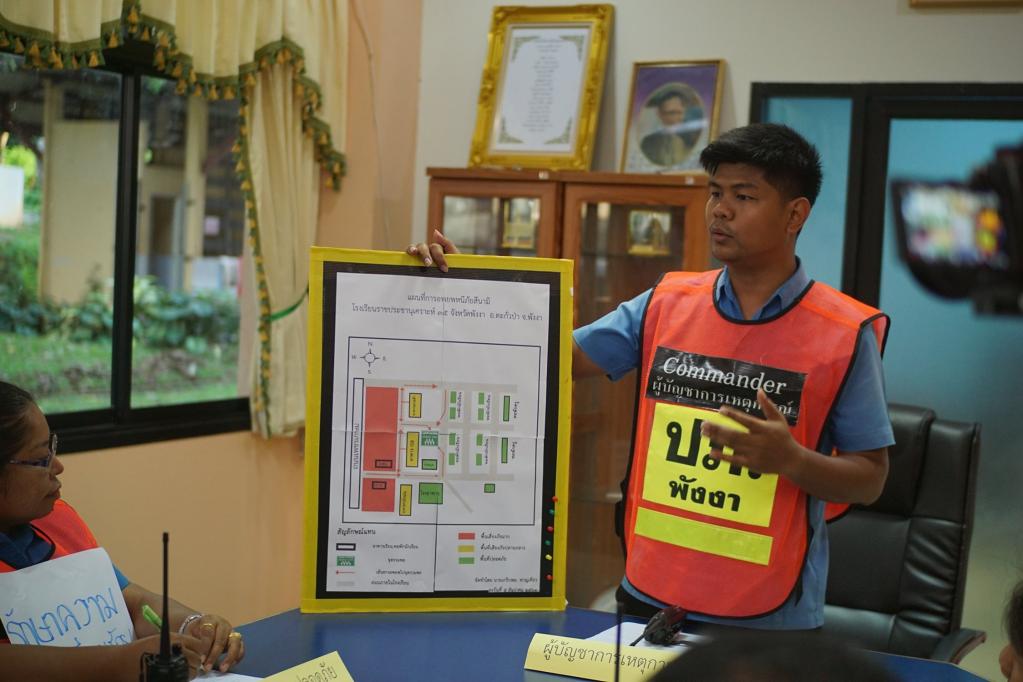
Story
03 November 2025
Legal Awareness Strengthens the Voices of Migrant Workers in Thailand
Chiang Mai, Thailand – “How much money would I get if I died in an accident?” The room fell silent after the bold question came from one of the migrant workers attending a labour rights and legal awareness session organized by the International Organization for Migration (IOM) and the Human Rights Development Foundation (HRDF) in northern Thailand. “You would not get any,” replies Ying, the community trainer leading the session. “But your family would receive compensation and funeral assistance.” For Ying, a 38-year-old migrant from Myanmar and a community leader helping her peers understand their labour rights, few things are as rewarding as watching others gain the confidence to ask such questions. “Helping people access their rights brings me happiness,” she says with pride. Originally from Shan State, Myanmar, Ying has spent nearly half her life working as a domestic worker in northern Thailand. Like many from her village, her parents migrated to Thailand in search of work. The family was separated for years before reuniting when Ying, then in her twenties, followed in their footsteps hoping for a more stable future. “At first, all I wanted was to see my parents again,” she recalls. “But they encouraged me to stay and build a better life here.” Being reunited with her parents eased her transition to a new country. They helped her find a job, complete the necessary paperwork, and learn Thai. But not everyone is as fortunate. Many migrants arrive in Thailand without proper information or language skills, leaving them vulnerable to exploitation and abuse. “Access to information is more than just knowing your rights – it’s the first step toward empowerment and protection,” says Jitradee Singhakowin, National Project Officer at IOM Thailand. “When migrants are informed, they can navigate challenges, protect themselves, and inspire others in their community to do the same.” Ying’s journey as a community leader began during the COVID-19 pandemic, when her aunt encouraged her to attend a legal training organized by HRDF and IOM. Since 2022, IOM and HRDF have been working together to provide migrant workers with accurate, up-to-date information on labour, migration, and social protection laws in their native languages through community outreach and training sessions. “We realized that the key to reaching migrant workers effectively is having workers themselves take the lead,” explains Polwish Subsrisunjai, Programme Director at HRDF. “They speak the same language, understand each other’s struggles, and share the same community ties.” With support from IOM, he and his team developed a training programme to teach legal knowledge and build the capacity of migrant community leaders, who now train others within their communities. After her first class, Ying was determined to stay involved.“I heard there was a class about labour laws in Thailand. I was unemployed at the time, so I decided to give it a try,” she says. “It turned out to be something I really liked.” Four years later, Ying now stands at the front of the classroom, guiding her peers through sessions that cover everything from labour rights to road safety – a topic often overlooked despite the fact that many migrants face occupational hazards while commuting or working in high-risk environments. “Our fellow migrant workers often ask about their rights when they are involved in road accidents,” she explains. “In general, there are fines and other costs if you’re at fault, but for migrants like us, the consequences can be much more complicated. That’s why we must do our best to follow the law.” The training not only helps migrants understand their rights but also empowers them to use grievance mechanisms when those rights are violated. Beyond the classroom, community leaders like Ying play a crucial role in helping peers navigate complex legal systems. They often step in to interpret, offer guidance, or help file claims. “I once worked on a social security case where I helped a migrant worker’s family receive compensation after he died on the job,” Ying says. “In another case, we helped someone claim support from the Workmen’s Compensation Fund. I’m proud to have played a part in those outcomes.” Ying isn’t alone in this endeavour. Her friend On, also from Myanmar, has been working in Thailand for over three decades and now dedicates her time to supporting other migrants. “I’m glad there are still people in our community who are brave enough to come forward and ask for help when they face injustice,” says On. “As a community leader, I feel proud when I can support someone through a difficult case or simply be there when they need help.” Both women believe that knowledge is power – and that empowering migrant workers to be self-reliant is key to building stronger, more informed communities. “The training gives us access to knowledge we wouldn’t have otherwise,” On says. “It’s very difficult for workers to find this kind of information.” Ying adds that gaining access to rights and information has made them more confident. “When you understand your rights, you can protect yourself and others,” she says. Their work continues to ripple outward as more migrants learn from their peers, helping create communities where awareness and solidarity replace fear and isolation. IOM’s community outreach activities for migrant communities on legal assistance are part of the Migration, Business and Human Rights Programme in Asia (MBHR Asia), funded by the European Union and the Government of Sweden.
Originally published by the Internation Organization for Migration
Originally published by the Internation Organization for Migration
1 of 5

Story
30 October 2025
ILO mentorship programme strengthens responsible business and due diligence in Thailand’s auto sector
BANGKOK (ILO News) – A pioneering mentorship initiative has helped Thailand’s automotive industry gained knowledge and tools to drive tangible workplace improvements, strengthen industrial relations and support responsible business practices.
The International Labour Organization’s (ILO) social dialogue mentorship programme reached more than 350 stakeholders, including managers, HR professionals, trade unionists and worker representatives, across the Thai automotive supply chain.
Implemented from October 2024 to August 2025 by the ILO-Japan Resilient, Inclusive and Sustainable Supply Chains (RISSC) project in Thailand, the mentorship programme provided a platform for constructive engagement between employers and workers. It forms part of a wider ILO toolkit, which also includes bilingual practical guidelines and training, aimed at helping companies and workers integrate social dialogue into their day-to-day operations.
By combining strategic guidance with hands-on application, the programme provides knowledge and tools needed for firms to align workplace practices with both national and international standards, whilst also building enterprise-level readiness for human rights due diligence (HRDD).
Reflecting on the success of the programme, David Williams, the manager of the ILO RISSC project, said: “This first-of-its-kind mentoring shows how social dialogue can be tailored to context while delivering real value to automotive firms and their workers. Social dialogue is not only a tool to resolve labour issues, but also a way for businesses to boost resilience and adaptability, factors that are becoming ever more important for competitiveness in an uncertain and rapidly changing world.”
Social dialogue encompasses all forms of negotiation, consultation, or exchange of information on key workplace concerns. It may be tripartite involving government, workers, and employers, or bipartite between employers and workers (or their representatives) at the enterprise or industry level. It is not only central to achieving decent work, but it can also be a tool for responsible business, not least in providing a framework for workers and management to work together to address workplace risks and challenges through human rights due diligence.
Thailand ranks among the world’s leading automotive producers and exporters, with the industry accounting for nearly 10 per cent of manufacturing GDP and employing nearly one million workers. The industry is home to a range of leading global automakers, together with an extensive and well-developed supply chain comprising both domestic and global auto parts suppliers.
Originally Published by the International Labour Organization
The International Labour Organization’s (ILO) social dialogue mentorship programme reached more than 350 stakeholders, including managers, HR professionals, trade unionists and worker representatives, across the Thai automotive supply chain.
Implemented from October 2024 to August 2025 by the ILO-Japan Resilient, Inclusive and Sustainable Supply Chains (RISSC) project in Thailand, the mentorship programme provided a platform for constructive engagement between employers and workers. It forms part of a wider ILO toolkit, which also includes bilingual practical guidelines and training, aimed at helping companies and workers integrate social dialogue into their day-to-day operations.
By combining strategic guidance with hands-on application, the programme provides knowledge and tools needed for firms to align workplace practices with both national and international standards, whilst also building enterprise-level readiness for human rights due diligence (HRDD).
Reflecting on the success of the programme, David Williams, the manager of the ILO RISSC project, said: “This first-of-its-kind mentoring shows how social dialogue can be tailored to context while delivering real value to automotive firms and their workers. Social dialogue is not only a tool to resolve labour issues, but also a way for businesses to boost resilience and adaptability, factors that are becoming ever more important for competitiveness in an uncertain and rapidly changing world.”
Social dialogue encompasses all forms of negotiation, consultation, or exchange of information on key workplace concerns. It may be tripartite involving government, workers, and employers, or bipartite between employers and workers (or their representatives) at the enterprise or industry level. It is not only central to achieving decent work, but it can also be a tool for responsible business, not least in providing a framework for workers and management to work together to address workplace risks and challenges through human rights due diligence.
Thailand ranks among the world’s leading automotive producers and exporters, with the industry accounting for nearly 10 per cent of manufacturing GDP and employing nearly one million workers. The industry is home to a range of leading global automakers, together with an extensive and well-developed supply chain comprising both domestic and global auto parts suppliers.
Originally Published by the International Labour Organization
1 of 5

Story
25 October 2025
UN at 80 and Multilateralism
Eighty years ago, in the ashes of war, the world came together around a bold idea -- that peace, dignity, and prosperity are possible only when nations work together.Those words that open the UN charter, "We the peoples of the United Nations," still define who we are. The United Nations is more than an institution. It is a living promise, one that spans borders, bridges continents, and inspires generations.That promise is now again being tested. Conflict, climate change, inequality, and the erosion of trust are shaking the foundations of our societies.The world faces a fast-changing technological landscape -- from artificial intelligence to bioengineering -- that offers both hope and risk.At the same time, the human family is more interconnected than ever. What happens in one part of the world reverberates everywhere.Yet, in the face of these challenges, the lesson of the past 80 years still holds true: no nation can solve global problems alone. The climate crisis does not stop at borders. Pandemics and disinformation do not carry passports.The only path forward is through cooperation, dialogue, and shared responsibility -- in other words, through multilateralism.Time for RenewalAs we mark the UN's 80th anniversary, we are not just celebrating history; we are looking ahead. Earlier this year, the secretary-general launched the UN80 Initiative, the most ambitious reform effort in a generation. It aims to make the UN better equipped to respond to the complex realities of today's world.It also reinforces what remains unchanged: our shared commitment to the values of the UN charter -- peace, human rights, and sustainable development.This renewal comes as member states have also adopted the Pact for the Future, a global agreement to modernise multilateralism and make it more inclusive, accountable, and effective.Together, these two initiatives chart a path forward -- towards a United Nations fit for purpose and towards a world that works for everyone.Regional LeadershipThailand joined the United Nations in December 1946, becoming one of its earliest members. Since then, the country has contributed in many ways -- from peacekeeping operations to humanitarian action, gender equality, and human rights.Thai peacekeepers have served with distinction in some of the world's most difficult environments, embodying the nation's belief in shared responsibility and global solidarity.Bangkok stands as one of the world's true hubs of multilateralism -- home to the United Nations Economic and Social Commission for Asia and the Pacific (ESCAP), a cornerstone of regional cooperation and one of the UN's largest and most historic regional bodies.This makes Thailand not only a strong national partner but also one of the world's great multilateral capitals -- a bridge between global priorities and regional action.From climate resilience to universal healthcare, Thailand's leadership and openness to cooperation have helped drive progress across the Asia Pacific and beyond. Hosting numerous UN regional offices, Thailand continues to embody the spirit of partnership, dialogue, and shared progress that lies at the heart of multilateralism.Partnership in ActionHere in Thailand, all UN entities work together under the joint UN Cooperation Framework, partnering with ministries, civil society, academia, and the private sector. Together, we are supporting communities to adapt to climate change, advancing digital transformation, and promoting gender equality and inclusion.Whether it is protecting forests, expanding access to education, or supporting social protection for the most vulnerable, our work reflects a shared belief that progress must be inclusive and sustainable.Thailand has also presented three Voluntary National Reviews on its progress towards the Sustainable Development Goals -- a clear signal of its transparency and commitment to global cooperation.Through its Sufficiency Economy Philosophy, Thailand has shown that local values of sustainability can shape global thinking.Defending MultilateralismAs we celebrate this year's UN Day and mark our 80th anniversary, it is also a moment for reflection. Multilateralism is not an abstract concept - it is about how we solve real problems together. It is about the world we want to leave to the next generation.Standing up for multilateralism means standing up for peace over polarisation, cooperation over competition, and trust over division. It means believing that we are stronger together.Looking to the FutureAs the UN Secretary General Antonio Guterres has highlighted, the challenges of our century demand a United Nations that listens more, delivers faster, and acts with courage.This also requires nations, communities, and citizens who are willing to work together in good faith. As we look towards the next 80 years, let us renew the promise of "We the Peoples" -- the promise that peace, dignity, and prosperity are possible when we act as one.On this United Nations Day, I extend my deepest appreciation to the Royal Thai Government, to our member states, and to the people of Thailand for their steadfast partnership and belief in multilateralism.The story of the United Nations is one of perseverance, partnership, and hope.Together, let us continue building a world that reflects the best of humanity -- one where no one is left behind.Published to mark United Nations Day and the 80th anniversary of the UN on 24 October 2025, this op-ed is authored by Michaela Friberg-Storey, Designated Representative of the UN Secretary-General and UN Resident Coordinator in Thailand.This was originally published by Bangkok Post.
1 of 5

Press Release
28 December 2025
Statement attributable to the Spokesperson for the Secretary-General on Cambodia-Thailand
The Secretary-General welcomes the ceasefire agreement between Cambodia and Thailand as a positive step towards alleviating the suffering of civilians, ending current hostilities, and creating an environment conducive to achieving lasting peace.The Secretary-General expresses his appreciation to Malaysia, the current ASEAN Chair, as well as China and the United States, for their efforts in support of a peaceful resolution of the situation.The United Nations stands ready to support efforts aimed at sustaining peace and stability in the region.
1 of 5
Press Release
29 November 2025
Thailand Celebrates International Volunteer Day 2025 and Launches the International Volunteer Year for Sustainable Development 2026 (IVY 2026)
Bangkok, 29 November 2025 – The Ministry of Social Development and Human Security (MSDHS), together with the Ministry of Foreign Affairs (MFA), the United Nations Resident Coordinator’s Office in Thailand (UNRCO), the United Nations Volunteers Regional Office for Asia and the Pacific (UNV Asia-Pacific), the United Nations Development Programme in Thailand (UNDP Thailand), the Thai Health Promotion Foundation (ThaiHealth), and the Together Foundation for People with Disabilities and Society, jointly celebrated International Volunteer Day (IVD) 2025 at Queen Sirikit Park, Bangkok.Held under the global theme “Every Contribution Matters”, the event marked Thailand’s national kick-off of the International Volunteer Year for Sustainable Development 2026 (IVY 2026). The celebration showcased Thailand’s vibrant volunteer spirit and its commitment to promoting inclusion, community engagement, and sustainable development.Key activities included the “Run Together for Inclusion” inclusive run, which created a space where persons with disabilities, volunteers, youth networks, and members of the public could run together on an equal footing—reflecting that volunteerism is a platform accessible to all and one in which everyone can participate with pride. The event also featured “A Ripple of Kindness”, a giving and sharing initiative through which essential relief items were collected to support the assistance and recovery of flood-affected communities in Hat Yai District, Songkhla Province. Volunteers from all sectors jointly sorted and delivered the donated items to the Prince of Songkla University Volunteer Center, with strong support from volunteers, event participants, and private-sector networks—particularly the Saha Group—in line with the organization’s cooperate volunteer concept.Government and UN leaders commend Thailand’s national culture of volunteerismSenior representatives joining the event included:Ms. Sunee Srisongtakarunlert, Deputy Permanent Secretary, MSDHSMr. Chetthaphan Maksamphan, Deputy Permanent Secretary, MFAMs. Niamh Collier-Smith, UN Resident Coordinator ad interim and UNDP Resident Representative in ThailandMr. Christian Hainzl, Regional Manager, UNV Asia–PacificIn his address, Mr. Chetthaphan emphasized that IVD is marked annually on 5 December to honour volunteers worldwide and to raise awareness of their contributions to national development. He highlighted that Thailand has more than 18 million formal and informal volunteers (as of 30 September 2025) playing a vital role in community services, social assistance, and local development.UN Resident Coordinator ad interim highlights Thailand as a model of civic engagementMs. Niamh Collier-Smith underscored volunteerism as “one of the most powerful forces driving sustainable development”, noting that volunteers “strengthen communities, protect the environment, and ensure that no one is left behind.”She commended Thailand’s long-standing tradition of civic engagement, describing the country’s 18 million volunteers as “an extraordinary demonstration of community leadership and national solidarity.” She also highlighted the importance of inclusive volunteering, noting that “activities like today’s Run Together for Inclusion show how Thai volunteer networks embrace diversity, especially by ensuring persons with disabilities are part of the movement.”Ms. Collier-Smith reaffirmed the UN’s commitment to support Thailand’s leadership in the upcoming International Volunteer Year:“Thailand’s launch today reflects strong national leadership and positions the country as a regional and global example. The UN stands firmly as a partner as Thailand moves from today’s celebration into the global observance of 2026.”She added that the theme “Every Contribution Matters” captures the essence of IVY 2026 because “every act of volunteering, big or small, helps build a greener, more inclusive society.”UNV underscores global trends and Thailand’s leadership in IVY 2026In his remarks, Mr. Christian Hainzl, Regional Manager of UNV Asia–Pacific, highlighted the significance of IVD 2025 as the year’s official launch of IVY 2026, as proclaimed by the UN General Assembly through resolution A/RES/78/127.He emphasized that IVY 2026 aims to be “truly inclusive—to ensure that everyone’s contribution is seen, valued, and recognized.” He praised Thailand for “its inspiring leadership as the first country in Asia to appoint a national IVY focal point and a national committee.”Mr. Hainzl highlighted significant global and regional trends in volunteerism, noting that 2.1 billion people—over a quarter of the world’s population—volunteer regularly each month, and that UNV will soon launch the Global Index of Volunteer Engagement as part of the State of the World’s Volunteerism Report to be unveiled on the International Volunteer Day, 5 December 2025 in New York.He concluded with a call to action:“Let us use IVY 2026 as a year of celebration, inspiration and solidarity—but also a year of action. Let us build systems for volunteering that are inclusive, support volunteers, and allow every person—regardless of age, gender, ability or background—to contribute meaningfully to society.”Thailand prepares for Thailand Volunteer Year 2026Deputy Permanent Secretary Ms. Sunee outlined national priorities for Thailand’s upcoming Thailand Volunteer Year 2026, which will align with the global IVY agenda. Key priorities include:Strengthening policy and legal frameworks for volunteerismEnhancing volunteer management systems toward international standardsExpanding awareness, capacity-building and motivation among volunteer networksThese initiatives will be complemented by efforts such as a National Volunteer Web Portal, regional volunteer coordination mechanisms, and continued collaboration with state media.A strong start to a year of global volunteer actionThe celebration marks Thailand’s early leadership in IVY 2026—positioning the country as a regional champion of inclusive, community-driven development. The UN system in Thailand reaffirmed its commitment to working closely with the Government, civil society, volunteer networks, youth groups, and persons with disabilities to ensure that volunteerism continues to drive resilience, equality and sustainable progress.
1 of 5
Press Release
04 November 2025
Asia-Pacific forestry leaders gather in Chiang Mai to advance ‘Healthy Forests Feed the Future’ agenda
Chiang Mai, Bangkok — Forests sustain over 22 million people, supporting livelihoods, food security, and agricultural productivity through ecosystem services such as pollination, soil fertility, and water regulation. They also act as carbon sinks and harbor rich biodiversity, making them critical to achieving the Paris Agreement, the Kunming–Montreal Global Biodiversity Framework, and the Sustainable Development Goals.Yet, forests face growing pressures from land conversion, urbanization, unsustainable use, and climate-driven threats such as deforestation, wildfires, pests, and floods. Declining biodiversity and ecosystem services put millions of livelihoods at risk, according to Food and Agriculture Organization of the United Nations (FAO) report ‘The State of the World’s Forests 2024’.More than 120 forestry experts, including Heads of Forestry from 20 countries are addressing these challenges at the Thirty-First Session of the Asia-Pacific Forestry Commission (APFC 31) and Asia-Pacific Forestry Week 2025 in Chiang Mai, Thailand, and online from 3–7 November 2025. Hosted by the Royal Forest Department of Thailand in collaboration with FAO, the event focuses on innovative forest management, inclusive partnerships, and supportive policies.Forests as foundations of food securityThe theme, “Healthy Forests Feed the Future,” highlights the role of forests in sustaining food systems and resilient landscapes. Discussions aim to guide regional priorities and help countries contribute to global biodiversity, climate, and development goals.“This platform allows us to share Thailand’s experiences in sustainable forest management and learn from others,” said Nikorn Siratochananon, Director General, Royal Forest Department, Thailand. “It reinforces our shared commitment to conserve forests as a source of life, livelihoods, and food security.”“Healthy forests are the backbone of healthy food systems,” said Alue Dohong, FAO Assistant Director-General and Regional Representative for Asia and the Pacific. “Forests enhance food availability by supplying a diverse range of wild foods and supporting sustainable agriculture through ecosystem services such as pollination, water regulation, and soil protection.”Key discussions and launchesParticipants are exploring how forests contribute to sustainable agrifood systems, informed by the 2025 Global Forest Resources Assessment, and forest-based bioeconomy approaches that offer pathways for sustainable growth and green jobs.The event also marks the launch of a new joint FAO–Center for International Forestry Research (CIFOR)–World Agroforestry (ICRAF) technical report, “Agroforestry for Wood Production – Insights from Multifunctional Smallholder Tree Farming Systems in Asia and the Pacific”, providing guidance for smallholder farmers to produce wood while maintaining ecosystem functions and diversifying incomes — an example of showing how healthy forests drive sustainable futures.“The Asia-Pacific Forestry Commission (APFC) remains a vital bridge for regional collaboration,” said Preecha Ongprasert, Chair of the APFC. “Through shared knowledge and collective action, we can ensure forests truly feed the future.”Regional collaboration and next steps“As we approach COP30 in Brazil, the 31st APFC Session and APFW2025 bring together countries and partners to drive collaboration on the forest-based bioeconomy, restoration, climate, and biodiversity action — underscoring the vital role of forests and trees in resilient agrifood systems,” said Sheila Wertz-Kanounnikoff, APFC Secretary and FAO Senior Forestry Officer.The sessions reaffirm collaboration among governments, international organizations, civil society, and research networks to address regional forestry challenges and opportunities. Collaboration will also be key to ensuring that the 380 million smallholders across Asia and the Pacific, who depend on agriculture for their livelihoods, are not left behind. Ongoing initiatives, such as Result Asia-Pacific, support the restoration of degraded lands and strengthen community resilience.The next APFC session will be held in 2027, with the host country to be announced.Media Contact
Mahira Afzal, Communications Specialist
Regional Office for Asia and the Pacific
Food and Agriculture Organization of the United Nations (FAO)
Bangkok, Thailand
Mahira.afzal[@]fao.orgAbout the Asia-Pacific Forestry Commission and Forestry WeekEstablished in 1949, the Asia-Pacific Forestry Commission provides a forum for Member Nations to coordinate forestry action. Asia-Pacific Forestry Week brings together stakeholders for knowledge exchange, learning, and collaboration.
Originally published by The Food and Agriculture Organization of the United Nations (FAO)
in https://www.fao.org/asiapacific/news/news-detail/asia-pacific-forestry-leaders-gather-in-chiang-mai-to-advance--healthy-forests-feed-the-future--agenda/en
Mahira Afzal, Communications Specialist
Regional Office for Asia and the Pacific
Food and Agriculture Organization of the United Nations (FAO)
Bangkok, Thailand
Mahira.afzal[@]fao.orgAbout the Asia-Pacific Forestry Commission and Forestry WeekEstablished in 1949, the Asia-Pacific Forestry Commission provides a forum for Member Nations to coordinate forestry action. Asia-Pacific Forestry Week brings together stakeholders for knowledge exchange, learning, and collaboration.
Originally published by The Food and Agriculture Organization of the United Nations (FAO)
in https://www.fao.org/asiapacific/news/news-detail/asia-pacific-forestry-leaders-gather-in-chiang-mai-to-advance--healthy-forests-feed-the-future--agenda/en
1 of 5
Press Release
24 October 2025
Thailand Commemorates 80 Years of the United Nations, Underscoring Collective Action for a Sustainable Future
Bangkok, 24 October 2025 – Thailand marked United Nations Day and the 80th anniversary of the UN today by reaffirming its commitment to multilateralism and the 2030 Agenda as a shared pathway for peace, prosperity, and sustainable development. This year’s commemoration echoes the UN Secretary-General’s call for the world to stand together and renew the promise of the UN. Michaela Friberg-Storey, Representative of the UN Secretary-General and UN Resident Coordinator in Thailand, commended Thailand’s sustained commitment to sustainable development at home and internationally, reaffirming UN support for the country’s priorities. “Thailand’s progress towards the SDGs is driven by the determination and resilience of its people. As the UN marks its 80th anniversary today, our joint exhibition “30 Stories, 17 Goals, One Road to 2030” stands as a testament to that spirit and to the power of partnership when ‘we the peoples’ act together. They show what is possible when we work together to make real change happen, by the people, for the people, and with communities.” Sarun Charoensuwan, Secretary to the Minister of Foreign Affairs, representative from the Ministry of Foreign Affairs of Thailand and on behalf of the Royal Thai Government, extended his congratulations on the occasion of the 80th anniversary of the founding of the United Nations. The UN has played a vital role in promoting peace and security, advancing sustainable development, and upholding human dignity for people around the world, he said. "I would like to express our heartfelt appreciation to the United Nations for its tireless efforts, and for its enduring partnership with Thailand in advancing the well-being of our people, protecting our planet, and promoting peace, prosperity, and partnership." He also reaffirmed Thailand’s active role in advancing the Sustainable Development Goals (SDGs) and its long-standing commitment as a good host to the United Nations Economic and Social Commission for Asia and the Pacific (ESCAP) and various UN entities based in Thailand. "We remain dedicated to providing a supportive environment for the UN system to thrive, and to ensuring that Bangkok remains a vibrant hub for multilateral collaboration in the region." At the heart of the commemoration was the unveiling of a special photo exhibition by the UN, in partnership with the Ministry of Foreign Affairs. The exhibition features 30 stories from across the country, highlighting the resilience and creativity of people and communities whose efforts, with UN partnerships and programmes, are helping to build a more sustainable and inclusive future. Among the featured stories are Salma Gadae from Yala, who found a second chance at education through the Learning Coin for Equitable Education initiative of the United Nations Educational, Scientific and Cultural Organization (UNESCO). Using digital tools and reading-based scholarships, she strengthened her Thai literacy and is now a youth leader preserving her community’s cultural heritage. Sarocha Kittisiripan, a social entrepreneur with visual impairment, founded PaperyBfly and produces inclusive podcasts with support from the United Nations Development Programme (UNDP)’s Youth Co:Lab initiative, turning her personal journey into social innovation that creates jobs and challenges stereotypes. Sumitr Srivisut, a farmer and community leader from Nakhon Si Thammarat, applies sustainable farming techniques learned through collaboration with the Food and Agriculture Organization of the United Nations (FAO) to increase productivity and income while protecting natural resources and sharing knowledge within his community. During the event, a fireside chat with these three individuals brought their experiences to the fore, offering reflections on Thailand’s journey toward the SDGs and the role of individual action in shaping a more inclusive, resilient, and sustainable future. The launch was attended by Member States representatives from the diplomatic corps, together with senior government officials, UN agencies, UN Goodwill Ambassadors, including Cindy Bishop and Alex Rendell, and partners from the private sector, civil society, and academia. Chadatip Chutrakul, Chief Executive Officer of Siam Piwat Group, the UN’s event partner, reflected on the importance of collaboration across sectors, noting that the private sector plays a critical role in uniting stakeholders towards shared goals. “We believe real progress comes from unity, especially when the public and private sectors, the UN, and people everywhere work together to make life better and drive our world toward sustainable growth. As the creator of global destinations, we welcome millions of visitors each year and witness the power of collaboration firsthand. By supporting this UN Day exhibition, we embrace our role in inspiring collective action from each and every one of us to create a more sustainable and inclusive future together.” The UN Day 2025 Exhibition “30 Stories, 17 Goals, One Road to 2030” is open to the public from 23 to 26 October 2025 at Siam Paragon (Living Hall, 3rd Floor). Visitors are invited to explore the 30 stories and reflect on how individual and collective actions are helping advance the SDGs and improve lives. This exhibition has been made possible in part through the support of Siam Piwat.
1 of 5
Press Release
28 August 2025
Statement by the United Nations in Thailand on Work Rights for Refugees
Bangkok (28 August 2025) - The United Nations Country Team in Thailand welcomes the decision of the Royal Thai Government to allow refugees from Myanmar living in temporary shelters along the Thai-Myanmar border to work legally in the country. This is a landmark step toward social cohesion and economic inclusion, benefiting both the refugees and the communities that host them. Legal employment opens access to health care, strengthens family well-being, and reduces vulnerabilities. This is especially important for women and girls and will also advance the Sustainable Development Goals on poverty eradication, education, decent work, and reduced inequalities. This decision is in step with Thailand’s withdrawal of its reservation to Article 22 of the Convention on the Rights of the Child, as well as the Cabinet’s resolution establishing pathways to nationality and permanent residence for nearly half a million stateless people. The United Nations Country Team stands ready to support the Royal Thai Government in implementing this important decision. For more information, please contact the UN Resident Coordinator's Office in Thailand at: rco-th@un.org.
1 of 5
Latest Resources
1 / 11
Resources
03 October 2024
Resources
08 April 2024
Resources
17 April 2023
1 / 11

























